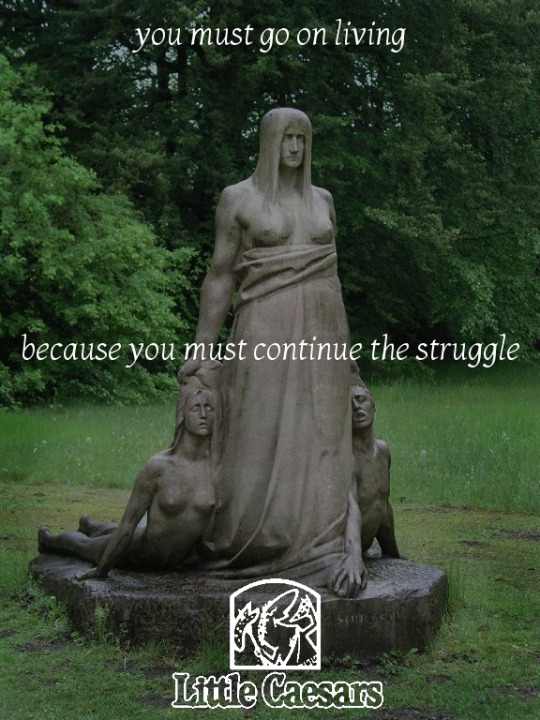Don't wanna be here? Send us removal request.
Text
wanna know what mental image just crept into my brain?
a clown funeral where the pallbearers accidentally drop the casket and like fifteen dead clowns fall out
209K notes
·
View notes
Photo




ah yes, my favourite way to outmaneuver the far right: join them and adopt their policies
664 notes
·
View notes
Photo

nothing is as important as this photo of tig notaro
561 notes
·
View notes
Video
youtube
“A Thousand Kisses Deep” was begun on Mt. Baldy (Leonard Cohen had co-written an earlier song with Jennifer Warnes, “Way Down Deep,” with some lyrical similarities). The final poem was first published by Cohen in 1998, on Jarkko Arjatsalo’s fan site The Leonard Cohen Files – one of the stalwart, remnant colossi of the late 90s’ homebrew special-interest fora, before social media or even blogging entered the lexicon. It was a different time; the Internet resembled villages scattered through the wilderness. Bowie had his ISP, Prince his interactive dimensions. Jarkko’s forum retains that sense of insular community, a sort of virtual Hydra, where the poet was occasionally in residence. The dedication in Book of Longing, “for Sandy 1945-1998,” refers to Sandy Merriman, a member who’d passed away.
Book of Longing organizes the definitive stanzas into two series. The first corresponds largely to the spoken-word “reprise” on Ten New Songs, as performed thereafter on tour. The recitation is sombre: a film noir voiceover addressed to a lover, full of sexual obsession and castigation, leavened with self-deprecating wryness.
Our perfect porn aristocrat, So elegant and cheap I’m old but I’m still into that A thousand kisses deep
The sung version cranks up the affect, underpinning Cohen’s velvetiest voice with a maracas-and-synth shuffle that wavers between chintzy and unsettling, Greek tavern and strip joint. Detective Nathan Adler ducks into Club Silencio and out the back alley, seeking Baby Grace Blue (yes, it gets sampled for deep house).
But the lyrics are about something else.
***
Recently I came across Michelle Allison’s Twitter thread, positing terror management theory as a paradigm for understanding the alt-right – or neoreactionaries, if you want to delve into the Red Pill’s philosophical underpinnings (such as they are). It’s succinct, and worth reading in its entirety. Her argument is that these people are afraid to die.
Here’s the thing: everyone manages their own terror. We’re all born with an instinct for self-preservation, but we’re all mortal:
The ponies run, the girls are young The odds are there to beat You win a while and then it’s done Your little winning streak
It’s enough for Thomas Ligotti to posit that sapience itself is a malicious aberration: there was no reason for God to have given a perfectly good monkey that kind of anxiety. To quote Douglas Adams, “In the beginning the universe was created. This had made a lot of people very angry and been widely regarded as a bad move.”
The crux of the theory, though, isn’t the fear, but its mitigation. In this telling, underlying terror is what drives human culture and aspiration: it’s what forces us to live. Creativity, ideals, children: anything to which you ascribe value, that convinces you that your life has value – that’s an immortality project. Anything, too, that convinces you the other guy will die first of bad health choices, or die eternally in hellfire; but that you’ll live, if you play your cards right.
And summoned now to deal With your invincible defeat You live your life as if it’s real A thousand kisses deep
If you’re at the very top of the heap, then you can really go big. Bog-literal immortality, because after all you have control of your own destiny, unlike “the wretched and the meek.” Accelerate technology until the Singularity takes over; live on a floating island and leave the proles to cannibalize themselves; extract the blood of teenagers for life extension (all actual ideas Peter Thiel has thrown a bunch of money at, per Philip Sandifer’s recent, vastly entertaining essay collection Neoreaction a Basilisk). Though, no present-day oligarch holds a candle to Qin Shi Huang Di, the first Emperor of China, who was concerned his murdered enemies awaited him in the underworld. So he had his army recreated in terracotta, man and horse all larger than life, and buried with him.
Imagine having that much confidence in your own agency: when you die, you’ll go to Hell and conquer it, like you conquered the known Earth. It’ll be a challenge. But you’ll be ready.
Qin Shi Huang Di never went a thousand kisses deep. Probably Peter Thiel won’t, either.
***
Empirical support for terror management theory usually involves demonstrating that memento mori cause people to retrench. The threat of death helps you remember what you believe in, even if you believe the solution to school shootings is to arm teachers with guns: it’s why you don’t see a lot of minds changing in the wake of tragedy. if an idea’s kept you safe from the Terror before, you’ll latch onto it harder, even if it’s more likely to get you killed. Death isn’t what hurts, the fear of death is.
And maybe I had miles to drive And promises to keep You ditch it all to stay alive A thousand kisses deep
The thing is, this is true of anyone, regardless of their core values. Leonard Cohen had his own strategy, one that took him down a different road, to a different place. He preferred to look back at it – the Terror – when it looked at him. He tried to win, then realized the truth is that you can’t win. The courage lies in acceptance; the comfort lies in courage.
I’m turning tricks I’m getting fixed I’m back on boogie street I guess they won’t exchange the gifts That you were meant to keep And quiet is the thought of you The file on you complete Except what we forgot to do A thousand kisses deep
Marcus Aurelius wrote, in his Meditations: In the morning when you rise unwillingly, let this thought be present – I am rising to the work of a human being.
And: You embarked, you made the voyage, you are come to shore; get out.
This is the last post of my Two Weeks One Band on Leonard Cohen. (If you want to start reading from the top: here.) All my thanks to Hendrik, and to everyone reading: as Leonard would say, you’ve been extraordinarily patient. XD; Big hugs especially to the folks who messaged me to say that they were enjoying it – that means a lot to a writer, always.
–XOXO, Sabina
29 notes
·
View notes
Audio
0 notes
Quote
One day [Aristippus] asked Dionysius (the ruler of Syracuse) for some money, who then said, “But you told me that a wise man would never be in want,” “Give me some,” Aristippus rejoined, “and then we will discuss that point;” Dionysius gave him some, “Now then,” said he, “you see that I do not want money.”
Diogenes Laertius, The Life of Aristippus (via freuds-cokedealer)
337 notes
·
View notes



















